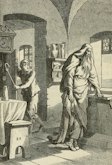The Knight of Our Lady
A fairy tale by Ludwig Bechstein
In days of yore there lived a doughty, pious knight who had made choice of the Blessed Virgin Mary for his patron saint, and he served her with a devout heart at all times.
One day the King had a great tournament announced, and the whole body of knighthood of the land betook themselves thither to break spears and lances and to win prizes. So the pious knight travelled to this tourney, and his way took him past a minster which was dedicated to the Virgin Mary and lay but a short distance from the plain where the tournament would be held and was soon to begin. Trumpets could already be heard blaring out in the distance. In the minster, many of the high clergy had assembled and High Mass was being celebrated, so the knight dismounted, gave his horse to his squire to hold, and said, “It better behoves me to commend myself to the Virgin Mary’s protection, so her hand may help me to an honourable victory” – then he took off his helmet and entered the House of God. One mass had been said almost to the end, but then another was begun, which the pious knight wished to hear in its entirety; and then another new one began, and the knight would not interrupt any of the masses, but he heard every one with reverence and prayed along in silence, and crossed himself.
And in this way, in such a state of reverence, did half of the day go by; the tournament had commenced long since and progressed so far that the tilting, the jousting, and many other knightly wargames were over by now; yet the time he had tarried in the minster seemed but a very short while to the knight, and he thought the day was yet young and he would still arrive in good time. However, when he arrived there he saw only a little of the buhurt, which is the last contest: in this, many knights contend on horseback with many others, and they fight one another with short swords or with maces until the heralds blow blasts of their trumpets to signal that the buhurt is at an end.
Now when the pious knight came to the lists, the joyous acclamation of many spectators rang out around him, just as if for the hero of the day; his friends offered him their hands in congratulation, others gave him rings and jewels which they had come to owe him, they said, for the tilts; and everyone loudly extolled him as a manly warrior whose like had never before been seen in the jousts (that is, in tilting) and in the ‘forest’[27] (that is, the prize-contest); and the heralds approached him, greeted him with reverence, and escorted him to the throne on which the King’s beautiful daughter was seated, dispensing the prizes; and with sweet words full of high praise, she allotted him the First Prize.
The knight did not know what was happening, and he plainly said that he deserved neither praise nor prizes. He had just this moment arrived, and by tarrying in the church, he had missed the tournament. But the knights and the young squires all swore he had been present, had overcome them all, and had carried the prize in all kinds of contests at the tourney.
Then the knight began to be sensible of the miracle that the Virgin Mary had worked for him while he was honouring her in the minster. And he rode thence to the monastery that was built next to the Minster of Our Lady and said, “I shall henceforth be knight to none other than the Virgin Mary, with constant prayer and with constant devotion.”
Praise be to Our Blessed Lady, the Queen of Heaven!
The New Book of German Fairy Tales

Notes: Translated by Dr. Michael George Haldane.
Contains 50 fairy tales.
Author: Ludwig Bechstein
Translator: Dr. Michael George Haldane
Published: 1856